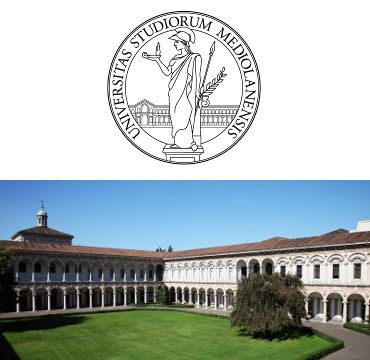Leading institute in Italy and Europe for scientific productivity
Proactive Internationalization strategy
Crops and Plant Sciences Master program

Leading institute in Italy and Europe for scientific productivity
Proactive Internationalization strategy
Crops and Plant Sciences Master program
Also known as ‘La Statale’, the University of Milan is, relatively speaking, one of Italy’s younger university institutions. It was founded in 1924 thanks to the tenacious efforts of doctor and gynaecologist Luigi Mangiagalli, who in creating La Statale, realised his long-held dream of building a university for Lombardy’s regional capital.
The University of Milan is a public teaching and research university, which – with 8 faculties and 2 schools and a teaching staff of 2000 – is a leading institute in Italy and Europe for scientific productivity. With a proactive role in science, technology, and economics networks, it is involved in national and international research programs and also collaborates with other scientific institutions. In fact, it is the results of our research, attested to by an important quantity of scientific publications (more than 24,000 in the last three years alone).
The Milan University Faculty of Agricultural and Food Sciences is the largest in Italy in the Lombardy area. With a broad, diversified educational offering, Agricultural and Food Sciences offers its students important training opportunities thanks to its modern laboratories – including those for advanced computer systems, chemistry, microbiology, sensorial analysis, genetics and molecular biology – its three experimental farms and an interesting greenhouse complex.
77 Undergraduate programmes
64 Master’s degree programmes
32 Doctoral programmes
75 Vocational masters
65 Postgraduate Schools
2.000+ Incoming/outgoing student mobility
1.200+ International agreements
21 Joint / Double degrees
22 Programmes in English
Research and education in plant breeding at University of Milan (UMIL) is mainly based at the Department of Agricultural and Environmental Sciences (DiSAA) located at the Città Studi campus in Milan. Related topics such as plant biology and bioinformatics are hosted at the Department of Biosciences (DBS), while expertise in plant functional genomics and crop biotechnology are present in both Departments. They both contribute to the overall teaching and research portfolio relevant for plant breeding at UMIL.
The UMIL Città Studi campus is located in Milan, well served by public transport (only 20 minutes from Milan city center) with easy connections to main airports and train stations.
Basic and applied research mainly focuses on the study and valorization of agrobiodiversity, crop genetics and genomics, crop improvement using classical methodologies supported by molecular tools. Facilities include laboratories, growth chambers, greenhouses, and fields at two experimental farms owned by the University, located a short distance from Milan. State of the art UNITECH platforms are available for microscopy, proteomics, metabolomics, and computing for analysis of complex data. We participate in the PhD programme in Agriculture, Environment and Bioenergy. Major research lines encompass traits such as yield and nutritional quality, plant architecture, and stress resistance. A range of different approaches are adopted, including exploitation of biodiversity, genetic dissection and adoption of different methods of selection.
Species targeted in our research projects include cereals, such as maize, rice and barley, energy crops such as giant reed and camelina, and fruit and vegetable species, such as stone fruits, grapevine, and pumpkin.
We have strong links to plant breeders and academic partners worldwide. We are involved in numerous national and international cooperation projects, such as European Union and ERA-Net projects.
The Master Degree course in Crop and Plant Sciences aims to prepare graduates with a broad cultural and scientific background, and competences in application of the scientific method to solve practical problems. Graduates will have a professional preparation in the sectors of plant production and plant biotechnology as well as skills to protect plants and manage cropping systems in a sustainable way.
Training focuses on in-depth knowledge of the current agricultural and breeding systems, with emphasis to innovative, sustainable, and environmentally friendly cultivation strategies. The degree course in Crop and Plant Sciences is characterized by in-depth study and specialization in scientific and design aspects in the broad sector of cultivation systems.
In particular, graduates will have:
Last updated : December 8, 2020